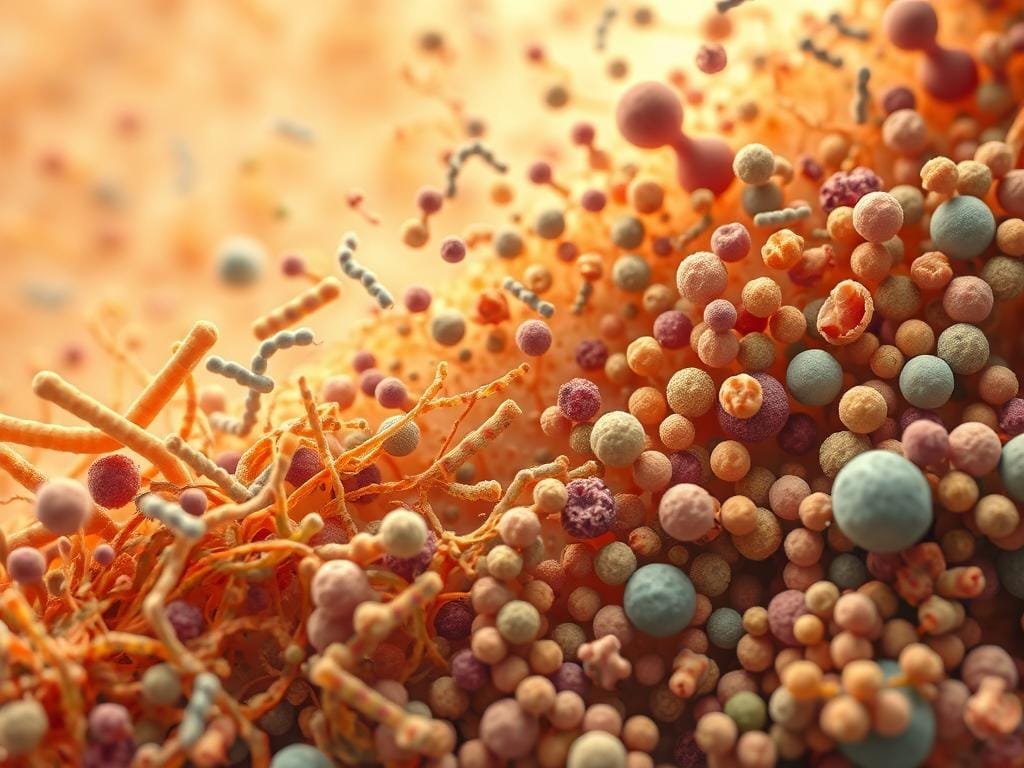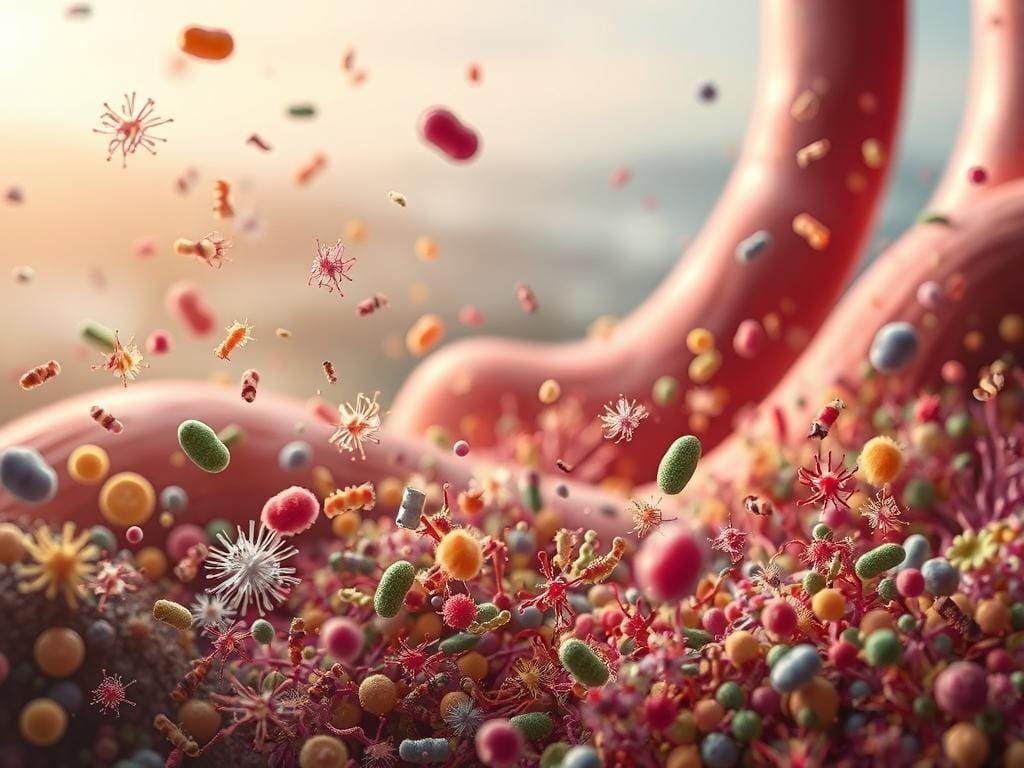Table of Contents
Gut Microbiome Mastery – Did you know your digestive system has trillions of microorganisms?
They play a big role in your health. Studies show a diverse gut bacteria can lower the risk of diseases like diabetes and inflammatory bowel disease.
To master your gut health, you need to understand the microorganisms in your intestines. Diet and habits greatly affect them. By choosing wisely, you can keep your digestive system balanced and improve your health.
Key Takeaways
- A diverse gut bacteria is linked to a lower risk of various health conditions.
- Diet plays a critical role in maintaining a healthy digestive system.
- Certain habits can significantly impact gut health.
- A balanced gut microbiome is essential for overall well-being.
- Making informed dietary choices can promote gut health.
Understanding the Gut Microbiome and Its Importance
Knowing about your gut microbiome is key to a healthy digestive system. It’s a complex world of trillions of microorganisms in your gut. These tiny beings are vital for your health and happiness.
What is the Gut Microbiome?
The gut microbiome is the community of microorganisms in your stomach. It’s made up of bacteria, viruses, and fungi. A balanced gut microbiome is essential for good digestion, nutrient absorption, and a strong immune system.
Role of Gut Bacteria in Overall Health
Gut bacteria are important for your health. They help break down food, make vitamins, and support your immune system. Having the right balance of gut bacteria is key to staying healthy.
Key functions of gut bacteria include:
- Breaking down complex carbohydrates and fibers
- Producing short-chain fatty acids that provide energy to the cells lining your colon
- Synthesizing certain vitamins, such as vitamin K and biotin
- Supporting the immune system by making it stronger against pathogens
How the Microbiome Affects Digestion
The gut microbiome is vital for digestion. It helps your body process and absorb nutrients. A balanced microbiome ensures food is broken down well and nutrients are absorbed efficiently. An imbalance can cause problems like bloating and irregular bowel movements.
Factors that can disrupt the balance of your gut microbiome include:
- A diet high in processed foods and sugar
- Antibiotic use
- Stress
- Lack of fiber
Keeping your gut microbiome healthy is important. Eat well, manage stress, and live a healthy lifestyle for good digestion and overall health.
Key Components of a Healthy Gut
To keep your gut microbiome healthy, focus on key elements. A healthy gut needs several important parts to work well. These parts help with digestion and overall health.
Essential Nutrients for Gut Health
Eating foods rich in essential nutrients is key for a healthy gut. Vitamins, minerals, and antioxidants are vital for the gut microbiome. For more info, check out this resource on the importance of a balanced diet.
Some important nutrients include:
- Omega-3 fatty acids: These fight inflammation and help the gut lining.
- Vitamin D: It’s good for the immune system, which is linked to gut health.
- Magnesium: It keeps the gut lining strong and aids digestion.
Types of Beneficial Bacteria
The gut has many beneficial bacteria types. These are key for digestion and health. Some of the best include:
- Lactobacillus: It supports digestion and boosts the immune system.
- Bifidobacterium: It helps digest food and makes vitamins.
These bacteria keep the gut balanced, which is vital for health.
Importance of Fiber
Fiber is vital for gut health. It feeds beneficial bacteria. Eating fruits, veggies, and whole grains helps keep the gut balanced. Fiber also:
- Helps beneficial bacteria grow.
- Supports regular bowel movements.
- Improves the digestive system’s health.

By focusing on these key areas, you can greatly improve your gut health and digestion.
Foods That Promote a Healthy Gut
A healthy gut microbiome is key for well-being. The right foods can make a big difference. Your diet is important for a balanced gut, and certain foods support good bacteria.
To keep your gut healthy, eat foods high in probiotics, prebiotics, and other good stuff. These foods help keep your gut balanced, which is good for your health.
Probiotic-Rich Foods
Probiotics are live bacteria that help balance your gut. Foods like yogurt, kefir, and fermented cheeses are full of them. You can also find them in supplements, but whole foods are better.
Yogurt has Lactobacillus acidophilus and Bifidobacterium bifidum, which are good for your gut. Kefir, a fermented milk, has many beneficial bacteria and yeast. It’s great for a healthy gut diet.
Prebiotic Foods to Incorporate
Prebiotics are fibers that feed good bacteria, helping them grow. Foods like asparagus, bananas, onions, and garlic are full of them. Adding these to your diet helps good bacteria in your gut.
Asparagus has inulin, a prebiotic fiber that feeds good bacteria. Bananas are also a good source of prebiotic fibers. They’re great for gut health. You can find healthy recipes with these foods.
Fermented Foods and Their Benefits
Fermented foods are full of good bacteria and compounds for gut health. Foods like sauerkraut, kimchi, miso, and tempeh are great. They have live cultures that help your gut.
Sauerkraut is a fermented cabbage dish with many beneficial bacteria. Kimchi, a spicy Korean dish, is also full of probiotics. Adding fermented foods to your diet helps your gut and overall health.
Foods to Avoid for a Healthy Microbiome
To keep your gut health in check, it’s important to know which foods to steer clear of. The gut microbiome is very sensitive to what we eat. Some foods can upset its balance.
Processed Foods and Their Impact
Eating too much processed food can harm your gut microbiome. These foods often have artificial additives and preservatives. These can change the gut’s bacterial balance, favoring bad bacteria.
Try to cut down on packaged snacks, frozen meals, and processed meats. Choose whole, nutrient-rich foods instead to help your gut stay healthy.
Sugary Foods and Gut Health
Sugary foods and drinks can also hurt your gut microbiome. Too much sugar feeds bad bacteria, letting them grow too much and cause problems.
Try to eat less sugary snacks, desserts, and sweet drinks. This can help keep your gut microbiome in balance.
Artificial Additives and Preservatives
Artificial additives and preservatives in many processed foods are bad for your gut. They can mess with the gut’s natural barrier and cause inflammation.
When you shop, pick products with fewer and more natural ingredients. This way, you’ll avoid harmful additives.
The Role of Hydration in Gut Health
Water is key for digestive health, affecting gut function and overall health. Drinking enough water helps dissolve nutrients and fiber, making them easier for gut bacteria to use.

How Water Supports Digestion
Water is essential for digestion. It breaks down food in the stomach, helping enzymes work better. Adequate hydration also keeps constipation away by softening stool and encouraging regular bowel movements.
Water is also vital for nutrient absorption. It dissolves vitamins, minerals, and other nutrients, making them easier for the body to use. This is important for a healthy gut and overall health.
Best Fluids for Gut Health
While water is the top choice for hydration, other drinks can also help gut health. Herbal teas, like peppermint and chamomile, can calm the digestive system and reduce inflammation.
Bone broth is also good for gut health. It’s full of nutrients and can heal the gut lining. It’s also a good source of electrolytes, helping keep hydration levels right.
- Water
- Herbal teas
- Bone broth
The Connection Between Stress and Gut Health
Stress can really affect your gut health. It can mess with digestion and upset the balance of your gut microbiome. Knowing how stress impacts your gut is key to keeping it healthy.
Effects of Stress on Digestion
Stress makes your body go into “fight or flight” mode. This means less blood flow to your digestive system. You might feel bloated, have stomach pain, or changes in bowel movements. Chronic stress can make problems like irritable bowel syndrome (IBS) worse.
Stress can also change the balance of bacteria in your gut. This imbalance, or dysbiosis, can mess with how you digest food and absorb nutrients. Keeping your gut bacteria in balance is vital for good digestion and health.

Mindfulness Techniques for Stress Reduction
Mindfulness can help lower stress and improve gut health. Activities like meditation and deep breathing can calm your mind and body. This can help your gut stay healthy and improve your overall well-being.
Adding mindfulness to your day can be easy. Start with short exercises and gradually do them longer as you get used to it. Being consistent is important to see the benefits for your gut.
| Mindfulness Technique | Benefits for Gut Health | Tips for Practice |
|---|---|---|
| Meditation | Reduces stress, promotes balance in gut microbiome | Start with 5-minute sessions, focus on breath |
| Deep Breathing | Calms the nervous system, improves digestion | Practice regularly, ideally before meals |
| Yoga | Combines physical movement with mindfulness, reduces stress | Begin with gentle flows, focus on breathing |
Understanding how stress affects your gut and using mindfulness can help. These steps can lead to a healthier digestive system and better overall health.
The Importance of Sleep for Gut Health
The quality of your sleep affects your gut microbiome health. Poor sleep can upset the balance of gut bacteria, causing digestive problems. So, it’s key to understand how sleep and gut health are connected for your overall health.
How Sleep Affects Gut Microbiome
Sleep helps your body repair and grow. It also strengthens your immune system. The gut microbiome is important in these processes. Without enough sleep, your gut bacteria balance can be off, affecting how you digest food and manage blood sugar.
This imbalance can lead to health issues like digestive problems and metabolic disorders. Research shows sleep deprivation lowers gut bacteria diversity, a sign of poor gut health. Lack of sleep can also reduce beneficial bacteria, making you more prone to infections and inflammation. Good sleep, on the other hand, boosts gut microbiome diversity and resilience, supporting your health.

Tips for Improving Sleep Quality
Improving your sleep quality can help your gut health. Here are some tips for better sleep:
- Stick to a consistent sleep schedule to keep your body’s clock in sync.
- Have a calming bedtime routine to tell your body it’s time to sleep.
- Stay away from caffeine and electronic devices before bed, as they can make it hard to fall asleep.
- Make your bedroom dark, quiet, and cool to create a sleep-friendly environment.
Adding these habits to your daily routine can greatly improve your sleep. For more tips on healthy habits, check out Boost Healthy Life for morning habits that support your sleep routine.
By focusing on sleep as a key part of your health plan, you can help your gut health and overall well-being. Remember, a good night’s sleep is essential for a healthy lifestyle, not just for rest.
Regular Exercise and Its Effects on the Gut
Regular exercise can greatly improve your gut health. It changes the gut microbiome in many ways, boosting your overall health. Adding exercise to your daily life helps keep your gut microbiome balanced.
Physical Activity and Gut Diversity
Regular exercise boosts gut diversity, which is key for a healthy digestive system. People who exercise often have a more diverse gut microbiome than those who don’t. This diversity leads to better digestion and a stronger immune system.
Exercise increases good bacteria and lowers bad bacteria in the gut. This balance is vital for good gut health. It also helps move food through the digestive system, lowering the risk of gut problems.
Types of Exercises Beneficial for Gut Health
Many exercises are good for gut health. Aerobic exercises like running, cycling, and swimming improve heart health and balance the gut microbiome. Yoga is also beneficial because it combines physical activity with stress relief, which is good for the gut.
- Aerobic exercises like running and cycling
- Yoga and other mind-body exercises
- Resistance training for overall health
Mixing different exercises into your routine can help balance your gut microbiome. It’s important to choose activities you enjoy and can keep up with over time. Staying consistent is key to enjoying the benefits of exercise for your gut.
Understanding Gut Health Tests
Gut microbiome testing gives you a peek into your gut’s balance. It helps you make smart health choices. Knowing about the tests can lead you to microbiome optimization.
Types of Gut Microbiome Tests
There are many tests to check your gut’s health. These include:
- Stool Tests: These are the most common, analyzing your gut microbiome through a stool sample.
- Blood Tests: Some tests measure markers in your blood that may indicate imbalances in your gut microbiome.
- Urine Tests: Though less common, urine tests can also provide insights into your gut health by measuring certain metabolites.
Some tests combine these methods for a deeper analysis. You can learn more about gut health testing by visiting Mastering Gut Microbiome Testing.
Interpreting Your Test Results
After a gut microbiome test, understanding your results is key. Here’s a simple guide:
| Test Component | What It Measures | Implications |
|---|---|---|
| Bacterial Diversity | The variety of bacterial species present | Higher diversity is generally associated with better gut health |
| Pathogenic Bacteria | Presence of harmful bacteria | High levels may indicate an imbalance or infection |
| Beneficial Bacteria | Levels of beneficial bacteria like Lactobacillus and Bifidobacterium | Sufficient levels are key for a healthy gut |
Understanding these results often needs a pro’s help. They can guide you on how to improve your gut health. This might include changing your diet, taking supplements, or other steps based on your gut’s needs.
Supplements to Consider for Gut Support
Supplements can be a great addition to your gut health routine. A balanced diet and a healthy lifestyle are key. But, some supplements can offer extra support for a balanced gut microbiome.
Probiotic Supplements
Probiotic supplements have live bacteria that match the good bacteria in our guts. They help restore the balance of gut bacteria. This can be lost due to antibiotics, stress, and bad diets. Choose a probiotic with many strains and enough CFUs.
Probiotics offer several benefits:
- They improve digestion and reduce IBS symptoms.
- They boost the immune system.
- They help make vitamins like K and biotin.
For more on improving your gut microbiome, visit Huberman Lab.
Prebiotic Supplements
Prebiotic supplements have fibers that feed good bacteria in the gut. This helps good bacteria grow and multiply. It leads to a healthier gut microbiome.
Prebiotics offer several benefits:
- They increase short-chain fatty acids, which give energy to colon cells.
- They help absorb minerals like calcium and magnesium.
- They support the immune system by promoting good bacteria.
When picking prebiotics, look for inulin or FOS. For more on natural supplements, see Boost Healthy Life.
In conclusion, probiotics and prebiotics are key for gut health. Knowing their benefits and choosing quality products helps maintain a healthy gut microbiome.
Building Healthy Habits for Gut Wellness
To keep your gut healthy, it’s important to add daily habits that help your digestive system. Creating a routine that boosts gut health can make you feel better overall.
Daily Habits to Support Gut Health
Some daily habits can really help your gut. For example, starting your day with a probiotic-rich breakfast keeps your gut flora in balance. Yoga and meditation also help by reducing stress, which is good for your gut.
- Drink plenty of water all day to stay hydrated.
- Make sure to include physical activity, like walking or jogging, in your daily routine.
- Try stress-reducing activities like deep breathing or mindfulness.
Creating a Balanced Diet for Life
Eating a balanced diet is key for long-term gut health. It means eating foods full of fiber, vitamins, and minerals. Eating a variety of fruits, vegetables, whole grains, and lean proteins helps your gut stay healthy.
To eat well, follow these tips:
- Plan your meals ahead to get all the nutrients you need.
- Add fermented foods like yogurt and sauerkraut to your diet.
- Try to eat less of processed and sugary foods.
By following these habits and eating well, you can keep your gut healthy. Remember, being consistent is important. Stick to your routine and adjust as needed.
Monitoring and Adjusting Your Gut Health Plan
Changing your diet and lifestyle is a big step. It’s important to watch how you’re doing and make changes if needed. This way, you can keep working towards a healthier gut.
Indicators of a Balanced Gut
A healthy gut means regular bowel movements and less bloating. You might also feel more energetic. Plus, your mood and skin could get better. Tracking these signs helps you see if your diet is working.
Knowing When to Seek Professional Guidance
If you keep having digestive problems, see a doctor. They can find out what’s wrong and help you make a plan. This way, you get the right help for your gut health.

